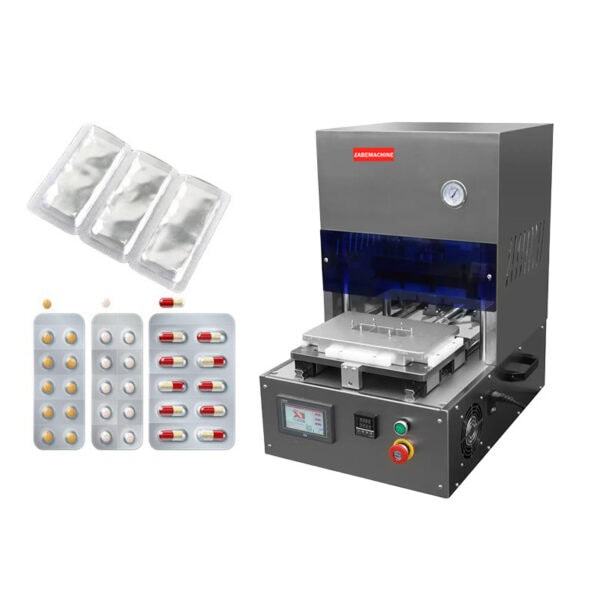Cold seal machines let you package stuff without using heat. When you have stuff that can’t handle heat because it will damage it or contaminate it, you need to use a different type of seal, hence, a cold seal.
A cold sealing machine uses pressure rather than heat to bond packaging materials that have been pre-coated with a cold seal adhesive. This method is ideal for delicate, heat-sensitive products, offering fast and reliable sealing without thermal energy.
These machines do a superior job in these areas where the integrity of the product being sliced up is a top-notch concern.

What is a Cold Sealing Machine?
Cold sealing machines are highly specialized devices designed to seal packaging materials using pressure rather than heat. These machines use a pre-applied cold seal adhesive that is activated by pressure when the packaging material is pressed together.
This process allows for fast and efficient packaging, especially for products that are sensitive to heat, such as chocolates, pharmaceuticals, and medical supplies.
Cold sealing machines are commonly used in various industries, including food and beverage, healthcare, and consumer goods. These machines feature rollers or applicators that ensure the adhesive is pressed firmly enough to create a reliable bond without the need for external heat sources. This method is quick, energy-efficient, and safe for products that cannot withstand high temperatures during the packaging process.
How Does Cold Sealing Work?
Cold sealing works by applying pressure to two adhesive-coated surfaces, causing them to bond. The adhesive is pressure-sensitive, meaning it activates when force is applied but remains inactive under normal conditions. This unique adhesive allows for secure sealing without the need for heat, water, or any other activating agents.
The sealing process relies on accurate pressure application, which ensures a consistent and reliable bond across the surface. This process is particularly advantageous for industries such as food packaging, where the preservation of product integrity is critical. Cold sealing is also much faster than heat sealing, as there is no need for the machinery to warm up or cool down.
Applications of Cold Sealing Machines
Cold sealing machines are used in a wide range of applications across industries. One of the most common uses is in the packaging of heat-sensitive products, such as chocolate bars or pharmaceuticals, where heat could cause melting or degradation of the product. Cold sealing is also used for medical supplies, sterile packaging, and flexible packaging in the food industry.
Another significant application is in Flat Labeling Machines, which benefit from the cold sealing process to ensure labels are applied without the risk of overheating or damaging the product packaging. Additionally, bottle unscramblers and packaging lines for delicate items often incorporate cold sealing technology to maintain product quality throughout the packaging process.
Cold Sealing vs. Heat Sealing
While both cold and heat sealing techniques are designed to secure packaging, they have significant differences in how they operate:
- Heat sealing uses thermal energy to melt and bond materials together. This method is common in general packaging applications but poses risks to products that cannot withstand heat exposure.
- Cold sealing relies entirely on pressure to activate an adhesive. This approach eliminates the need for heat and allows for much faster sealing times, which is ideal for sensitive products like medical supplies and confectionery.
Cold sealing machines typically operate at higher speeds than their heat-sealing counterparts, as there is no time lost waiting for elements to reach the necessary temperatures. The lack of heat also reduces energy consumption, making cold sealing an eco-friendly option for manufacturers.
Key Features of Cold Sealing Machines
Cold sealing machines come with several notable features designed to optimize the packaging process:
- High-Speed Operation: Cold sealing machines offer faster throughput compared to heat-sealing machines since they do not require any heating time.
- Temperature Independence: These machines do not require heat, making them ideal for products that could be damaged by high temperatures.
- Adjustable Pressure Settings: The ability to precisely adjust the pressure ensures uniform sealing across various packaging sizes and materials.
- Energy Efficiency: Cold sealing systems consume less energy because they do not require power to generate heat, making them a sustainable choice.
For manufacturers involved in packaging heat-sensitive products or those looking for faster packaging solutions, cold sealing machines are a valuable investment. They integrate well into automated lines, especially when used alongside Bottle Filling Machines, making them highly versatile for mass production environments.
Types of Cold Sealing Machines
Several types of cold sealing machines are available, each catering to different packaging needs. Flat Labeling Machines, for example, are specifically designed for packaging flat surfaces like sachets or pouches, which require consistent pressure during the sealing process. On the other hand, bar and pouch wrappers are engineered for industries such as confectionery and pharmaceuticals.
Cold sealing machines can also be customized to handle specific packaging formats, including pouches, films, and foil-based materials. This versatility allows manufacturers to adapt the machinery to their unique packaging requirements, ensuring a secure seal for any product type.
Advantages of Cold Sealing Machines
Cold sealing machines provide numerous advantages over traditional heat sealing methods:
- Product Integrity: Sensitive products such as chocolate or medical supplies are not exposed to heat, preserving their quality.
- Faster Packaging: Cold sealing speeds up production lines by eliminating heating times.
- Lower Energy Costs: These machines consume less power, reducing overall energy expenditure.
- Customization: Cold sealing machines can be adjusted for different packaging materials and sizes, providing flexibility for manufacturers.
Conclusions
For industries such as food, pharmaceuticals, and consumer goods, cold sealing is a cost-effective, efficient, and reliable packaging solution. The ability to maintain product quality while increasing throughput makes these machines essential for high-demand production environments.









